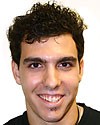Do you count yourself as one of the 113 million Americans who use the Internet for medical self-diagnosis? Are you part of the 80 percent of all Internet users in this great country who prefer to look at pictures of similar symptoms online in order to figure out what’s wrong with you to moving your sick self into the Campus Health Service? If the answer is yes, you better read this before you end up trying to cure your next acne outbreak with an acid-laced pumice stone.
As the Internet enables us to do more from the comfort of our own homes and dorms, many of the once tedious activities that drove serious wedges into our daily schedules are being taken care of more quickly and more efficiently.
Online banking has lessened the need to stand in painfully long lines, and Internet porn has single-handedly saved millions of guys from the shame and embarrassment of having to check out sex tapes on the Casa Video account they share with their girlfriends.
(Sub-question: Are the hangy beads that separate regular movie section from adult movie section placed there only to create uncomfortable noise in order to draw attention to the losers hanging out in there or a legitimate Feng Shui attempt?)
But the as the Internet giveth, so it taketh away – from doctor’s bills, that is. According to a report released over the weekend by the Pew Internet Project, 113 million Americans are now using the Web for medical advice. In fact, the report found that about 10 million of us are using such Web sites every day.
But it’s not just that we like to look online to see what we may or may not be afflicted with. We are doers, and being proactive means putting into your body whatever your computer tells you to. The report discovered that 58 percent of all people who gather medical information online actually use that information in making decisions about how to treat an illness or medical condition.
Not so bad, one might think. This online bevy of health-related information saves time, saves money and gives us college students an overinflated sense of confidence and medical know-how. That may be, but it looks like it also gives us a lot of dubious advice.
That’s right, according to the report, barely a quarter of all health-seeking net surfers actually do their homework – 75 percent of them never check to see where or when their lifesaving information is coming from. Translation: 85 million Americans trusting apocryphal data without taking the time to figure out its origins.
And we’re not talking about a trust issues with WebMD. Of the 113 million Americans searching the Internet for health advice, only one-third actually begin with a health provider like healthline.com (or my personal favorite, mammahealth.com – let that soak in for a minute: mammahealth). Instead, consumers are opting for general search engines, which could lead you to Harvard’s health advice – or to eBay’s do-it-yourself infection-fighting kits.
Still, hypothetically this data isn’t problematic in itself. In theory, you check the Net to compare your upper thigh with 1,000 others on Google images, then schedule an appointment with a doc for a once-over and some rash cream.
(Is anyone else excited to see where this subplot goes now that Google has purchased YouTube? Are others imagining millions of Americans tuned in to home videos of competitive testicular self-examinations as a “”prevent cancer”” learning guide?)
But more bad news from the people at Pew. Their report suggests that of everyone using the Internet to stay healthy, only two-thirds ever even mention their searches, or their results, to their doctors.
So it seems that not only are we relying on potentially flawed or outdated advice to make decisions about our health; we are doing it without ever consulting the professional opinion of someone who, let’s say, went to medical school.
The data speaks for itself. While the Internet may streamline critical life-affecting decision making, more and more of us are sacrificing sound health advice in the hopes of avoiding a trip down to Campus Health or a potentially awkward meeting of our mammaries and foreign fingers.
But it’s not worth it. Let’s not trust the Internet to do a job we make our medical students pay $200 bajillion to learn.
So, the next time you feel like your “”razor burn”” might be worth investigating, or the computer’s advice to solve your skin problem with a switchblade feels just a bit off, take the time to visit a doctor.
You – and your body – will be thankful down the road.
Stan Molever is a senior majoring in philosophy. He can be reached at letters@wildcat.arizona.edu.









